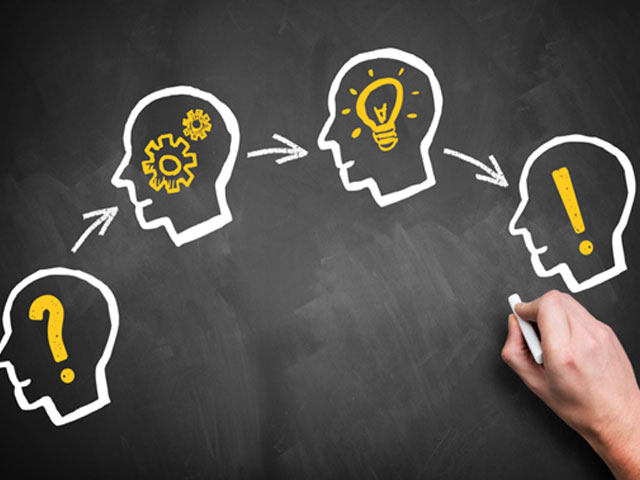EDUCATIONAL PSYCHOLOGIST – 34

INDONESIA
Dear readers, in the last article we saw how can we use friends and families as good influences and our innate imitating behavior for bringing in the practice of good habits. This month we will look into different types of cognitive distortions and how they affect our behavior and create suffering. We will also investigate strategies which will help in a particular cognitive distortion.
What is a Cognitive Distortion?
They are a set of automatic thought patterns that are inaccurate and reinforce our emotions. These automatic negative thoughts distort our thinking by leading us to believe something that is both unhelpful and likely untrue.
Today we will see 12 kinds of cognitive distortions and see if we can resonate with any of the thought patterns as you deal with your current emotional situation.
- ALL OR NOTHING THINKING
It is to assume that all your issues are black and white and only two explanations for something exist. For example, my parents love me or hate me. You are an intellect or stupid.
- BLAMING OTHERS
Holding other people responsible for bad situations than taking responsibility yourself. For example, if your friend promised to help you in your project, due to some important exams, blaming her for not being trustworthy and thinking she is the who reason you are suffering with the deadline. Instead, if you would checked with her again to get the confirmation or did your planning in time. It would have been easy.
- CATASTROPHIZING
Focusing on the worst, most unpleasant possible outcome to a relatively small issue or event is unhelpful and melodramatic. Things don’t always have to feel like the end of the world.
- EMOTIONAL REASONING
Just because you feel it, doesn’t make it true. It’s easy to read emotions as truth in the heat of the moment, but emotions are not reliable indicators of reality. Even if you strongly feel your colleague is out to get you, not only is that probably not true, but your colleague probably isn’t even thinking that much about you as you are thinking of you.
- FORTUNE-TELLING
If there’s one thing you can be certain of, it’s that you can be certain of nothing. Yet, we still all love to be the astrologers of the future and assume we know exactly what is going to happen i.e., because you feel embarrassed doesn’t mean your career is ruined.
- LABELING
“I made a mistake in math test; I am a stupid.” Labeling is where people make big judgments about someone’s character based on small experiences. We all do this many times, when someone cuts a line in a bank or supermarket, we assume that person is a horribly selfish human being.
- MAGNIFYING THE NEGATIVE
Your emotions often cause you to look at a situation with tunnel vision. When you magnify the negative, you tend to ignore anything positive that might have happened… which might actually make you feel less miserable about the situation.
- MINIMIZING THE POSITIVE
To allow negativity to live and breathe even more freely, some people actively quash the value or importance of the positive aspects of a situation. When we downplay our accomplishments and insist that anyone could have done what we did, we are downplaying the positive.
- MIND READING
Similar to fortune-telling, mind reading makes melodramatic predictions about reality without proof. On contrary, we use fortune-telling in an attempt to predict the future based on our emotions we use mind reading to assume we know what someone else is thinking/ feeling based on our own emotions. My colleague hates me and planning to sabotage my project.
- OVER GENERALIZATION
Applying blanket assumptions to your situations based on fragmented personal past experiences and little evidence leads to broad and unrealistic conclusions. Stereotypes about various sects of people are the most common form of over generalization. But we do this pretty much in every situation. Especially when couples argue and say things like, “YOU always do this” or “You only care about that.”
- SELF-BLAMING
Self-Blaming is the belief that everything is your own fault, that if anything bad happens to you, it’s because you’re an idiot or evil. Self-blaming is really just a form of self-absorption it’s usually an emotionally driven attempt to constantly garner sympathy. And it’s not really helpful for anyone.
- “Should” Statements
If you think you or someone elase should have done something and there’s little wiggle room for alternatives of how things could have played out, then you are setting unfair rules and expectations on yourself or other people. This sortof distortion leads to feelings of guilt and anger.
Okay, now that we’ve seen cognitive distortions, which ones do you think apply to your situation?
For example, when my friend makes a sarcastic comment in a WA group shouting out my name, even though it wasn’t my fault. I was doing emotional reasoning and mind reading and feeling angry and upset about her. In reality, she did not do it intentionally and taking it casual. When I expressed my concern, she respected my boundaries.
In the next article we will seeing the steps to use while doing catestrohizing.






